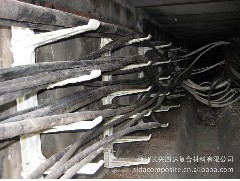SMC insulation products: What are the advantages of SMC materials
1. Chemical corrosion resistance: Fiber reinforced polyester materials have good corrosion resistance properties, such as acid, dilute alkali, salt, organic solvents, and seawater, while metal materials are not resistant to acid and seawater.
2. Lightweight and high-strength: Specific strength and modulus are one of the indicators for measuring the bearing capacity of materials. The specific modulus of fiber-reinforced polyester material is comparable to steel, but its specific strength can reach four times that of steel.
3. Good electrical performance: This material not only has excellent electrical insulation, but also maintains good dielectric properties at high frequencies, is not affected by electromagnetic waves, and does not reflect electromagnetic waves. These properties far exceed what metal materials can compare to.
4. Gap sensitivity: When the component is overloaded and a small amount of fibers break, the load quickly distributes on the undamaged fibers, thereby achieving mechanical balance again. This is incomparable to metal components.

5. Good practicality: The tensile strength of fiber-reinforced polyester materials is slightly better than that of steel. Steel and most metal materials have a tensile strength of 40% -50%, while fiber-reinforced composite materials generally have a tensile strength higher than this value, reaching 70% -80%.
6. Low thermal conductivity and small expansion coefficient: When there is a temperature difference, the thermal stress generated is much smaller than that of metals.
7. Flame retardant, smoke-free, and pollution-free: This material is a flame retardant material with a flame retardant rating of FV0, a smoke intensity of 15 under high temperature combustion, pollution-free smoke, and a toxicity level of ZA1.
8. Long service life: It has been proven that its service life is at least 20 years or more; The simulated aging test shows that its service life exceeds 20 years, far exceeding traditional materials such as metals.
Article source:SMC insulation products http://www.jmlicheng.com
-
04-29
Types of sheets used for SMC products
Common fiberglass processes include hand lay up, RTM, pultrusion, and compression molding, with steel molds used for mass production of pultrusion and compression molding. Molding strengths: (1) The m
-
03-25
SMC fiberglass mold laying steps
SMC mold is a combination plastic mold used for compression molding, extrusion molding, injection molding, blow molding, and low foaming molding. It mainly consists of a concave mold with a variable c
-
02-25
What are the characteristics of SMC molded insulation board
SMC is a thermosetting reinforced plastic with the following characteristics:;1. The stability of the line expansion standard is good, and the cold and hot deformation system is very small.2. Good cre
-
01-09
How to improve the quality of SMC products
The molding quality of SMC accessories depends on factors such as press equipment, molds, technical parameters, and the quality of operators. The excellent and stable quality of SMC molded parts not o
